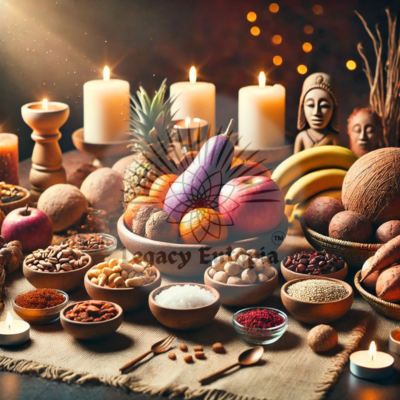Do Worshippers Believe Orishas Consume Their Food Offerings?
In the Yoruba religion, worshippers don’t typically believe that the Orishas physically “eat” the food offerings in the same way humans do. When asking the question Do Worshippers Believe Orishas Consume Food Offerings? The belief is more symbolic and spiritual. Here’s how this concept is understood:

A Deep Dive into Yoruba Spirituality
Core Beliefs of Alaafia Eboriru
Differences Alaafia Eboriru vs Yoruba
Alaafia Eboriru Specific Rituals
Do Worshippers Believe Orishas Consume Food? ( you are here)
Why Are Food Offerings Made to Orishas?
In the Yoruba religion, worshippers don’t typically believe that the Orishas physically “eat” the food offerings in the same way humans do. Instead, the belief is more symbolic and spiritual. Here’s how this concept is understood:
1. Spiritual Nourishment
The Orishas are considered spiritual entities that absorb the ase (life force or energy) of the offerings, rather than physically consuming the food. When worshippers offer food, they believe the Orishas are drawing upon its spiritual essence, which strengthens the connection between the divine and the human world. This spiritual nourishment allows the Orishas to maintain their power and continue supporting their devotees.
2. Transfer of Energy
The Yoruba religion emphasizes the flow of ase, which exists in all living things, including food. When an offering is made, the Orishas are thought to absorb the ase from the food. The physical food remains, but its spiritual energy has been transferred to the divine realm. The offering is seen as an exchange of energy between the worshippers and the Orishas, symbolizing respect, devotion, and a desire for balance.
3. Rituals of Consumption
After the Orishas have been spiritually nourished, the food offered is often shared among the participants of the ritual, symbolizing a communal connection. This act of sharing the food is called “eating the Orisha’s leftovers,” which is believed to impart blessings and protection from the deity. In this way, worshippers partake in the energy of the offering after it has fulfilled its spiritual purpose.
4. Sacred Foods and Preferences
Each Orisha has particular foods they prefer, and offering these specific items is seen as a way to honor them. The worshippers don’t believe that the Orishas consume the food in a literal sense, but that the deities receive and are pleased by the thoughtfulness of the offering and the devotion behind it.
In summary, while Orishas don’t physically consume the food, they are believed to absorb the spiritual energy of the offering, with the act symbolizing a deep, reciprocal relationship between the divine and the devotee.
SpiritFairie Whispers on Youtube
